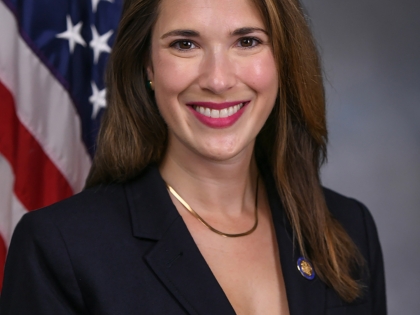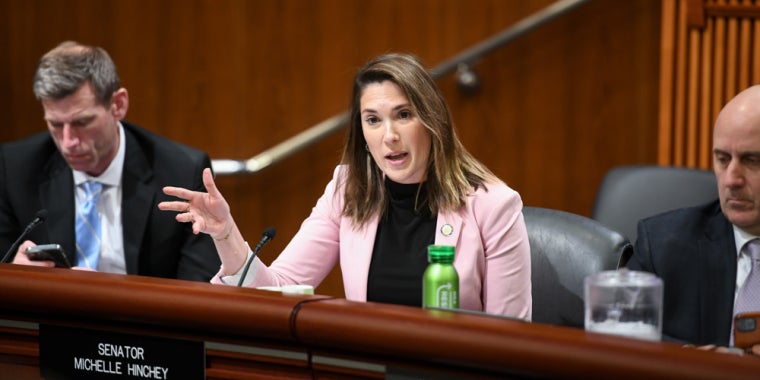
Hinchey, McDonald, District Attorneys Urge Governor to Sign Bill Expanding Access to Mental Health Courts
October 30, 2025

Hinchey and McDonald were joined in Albany on 10/29 by the President of the DA's Association of the State of New York; DA's from Albany, Ulster, and Columbia; reps from NAMI, Senators Patricia Fahy, Jake Ashby, and Assemblymember Gabriella Romero.
Bill Would Expand Pathways to Treatment and Permit Transfer of Eligible Cases to Neighboring Mental Health Courts
ALBANY, NY – Senator Michelle Hinchey, Assemblymember John T. McDonald III, RPh, and District Attorneys from the Hudson Valley and Capital Region are urging Governor Kathy Hochul to sign their legislation to expand access to mental health courts. The bill (S.8312/A.7563), which passed the Senate unanimously in the 2025 session, following its passage in the Assembly, would allow people with mental illness who have been arrested and are going through the court system to have their cases heard in a nearby mental health court if one isn’t available in their county and all parties agree. The measure awaits the Governor’s action before the December 31, 2025, deadline.
Mental health courts focus on treatment to address underlying causes of behavior, breaking cycles of repeat offenses and improving long-term public safety—outcomes rarely achieved through incarceration alone. Under the bill, cases can be transferred to a neighboring county’s mental health court when all parties agree—the defense, district attorneys from both counties, and the receiving court. This will help ensure that individuals in counties without a mental health court still have access to a process that meets their needs and can reduce the risk of future harm.
Senator Michelle Hinchey said, “Not every county in New York has a mental health court, and that gap means people with severe mental illness who are arrested can’t access the kind of intervention that stops repeat offenses and gets them on a path to recovery. Our bill fixes that by allowing eligible cases to be heard in a neighboring county’s mental health court when all parties agree. Our bill passed the Senate unanimously, and now we need the Governor to sign it into law. This is a smart, practical measure that would make our justice system more effective in keeping our communities safe and helping people get the treatment they need to turn their lives around.”
"Mental health courts work to address problems with solutions — reducing recidivism, connecting communities with treatment resources that benefit both justice-involved individuals and New Yorkers as a whole, and establishing restorative pathways within our justice system,” said Senator Patricia Fahy. “I look forward to the passage of this bill, and I commend my colleagues Senator Michelle Hinchey and Assemblymember John McDonald for their efforts that moved this bill forward.”
Assemblymember John T. McDonald III, RPh, said, "Mental health courts allow a person to be diverted to appropriate treatment, and this bill will increase access to individuals who may not have a mental health court in the county where they reside. With the consent of both district attorneys, the case can be transferred to a neighboring county that has a mental health court. We should not let geography be a barrier for those who can benefit from these services. We have had success with the Law Enforcement Assisted Diversion (LEAD) Program in Albany County, and this would be another option to direct even more people to the mental health services that they need."
“I was proud to cast my vote in favor of this important legislation to help improve access to mental health courts,” said Assemblymember Gabriella A. Romero. “This is a crucial step to ensuring that people with mental illnesses receive restorative treatment and that our legal system is able to adequately address underlying issues to improve public safety long-term. Simply put - this removes jurisdictional barriers and allows more people to get access to the treatment they need. I stand with Assemblymember McDonald and Senator Hinchey and strongly urge Governor Hochul to sign this bill into law.”
District Attorneys Association President, Mary Pat Donnelly, said, “This legislation grants District Attorneys within the state the discretion to transfer eligible cases to a mental health court. By providing an alternative pathway focused on treatment and support for individuals with mental health conditions, this initiative promotes rehabilitation while alleviating pressure on the criminal justice system. This can be viewed as a collaborative approach that has the potential to reduce recidivism within our counties.”
Susan Bryant, Executive Director, New York State Defenders Association, said, “NYSDA urges Governor Hochul to sign into law this common sense and fair bill that will enable criminal cases to be transferred to mental health courts in adjoining counties from counties that do not have mental health courts. Since many counties do not have their own mental health courts, this law will help bridge that gap and allow individuals access to the services and supports that mental health courts can offer. New Yorkers should have equitable access to mental health courts, and it should never be limited based on geographic location. NYSDA thanks Senator Hinchey and Assemblymember McDonald for working together to pass this bill, and we look forward to continued support in making sure that all individuals charged in the criminal legal system have appropriate treatment and care that will enable successful outcomes.”
“Our mental health courts provide an alternative to traditional criminal procedures for offenders with mental illness by prioritizing treatment over incarceration,” said Albany County DA Lee C. Kindlon. “I applaud the work of Senator Hinchey and Assemblymember McDonald in expanding access to counties across our state that don’t have these courts available, which will help lead to better outcomes for individuals and a more efficient use of public resources.”
Columbia County District Attorney Chris Liberati-Conant said, "As the mental health epidemic continues unabated, I welcome the expansion of mental health treatment courts. Mental health court is a powerful tool to increase public safety by bringing supervision and treatment to mentally ill defendants charged with misdemeanors."
Ulster County District Attorney Manny Nneji said, “Senator Hinchey’s legislation fills a gap that has become a blackhole in which some mental health defendants are lost until they hurt someone or themselves or, even worse, kill. The current catch-and-release of low-level offenders with serious mental health issues misses the mark in protecting those individuals and the communities in which they interact. This legislation is a strong step in compassionate accountability and treatment for mentally ill defendants. It undoubtedly also has a preventive quotient to it. I support this legislation and hope that in the short run Ulster County will have its own dedicated mental health court.”
Dutchess County District Attorney Anthony Parisi said, "This legislation represents a thoughtful and compassionate advancement in how we address mental health within our criminal justice system. By empowering my office to transfer cases involving individuals with mental health challenges to counties that offer specialized mental health courts, we are prioritizing treatment and recognizing that recovery and accountability can go hand in hand. With strong safeguards in place, this bill ensures that those in need receive the appropriate support while maintaining the integrity of our legal system. I commend Senator Hinchey for her leadership and vision, and I fully support Governor Hochul in signing this important measure into law."
James Norton, NAMI, NYS Government & Community Affairs Manager, said, “People with mental illness and substance use disorders (SUDs) deserve help, not handcuffs. Yet, individuals with these conditions are overrepresented in the criminal justice system. Mental illness is not a crime, but untreated symptoms and limited access to care often lead to justice system involvement. Specialty courts, such as mental health treatment courts and veterans courts, are evidence-based approaches that help reduce the number of people with mental illness in jails and prisons by focusing on treatment rather than punishment. This bill expands access to Mental Health Courts for countless individuals who currently do not have one available in their county. NAMI-NYS strongly supports the continued expansion and access to Mental Health Courts across New York State. We thank the bill's sponsors and staff for their work and look forward to this bill being signed."
###
related legislation
Share this Article or Press Release
Newsroom
Go to Newsroom

Read More
Read More
